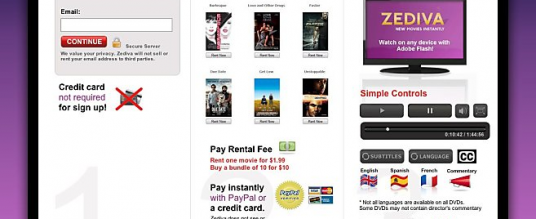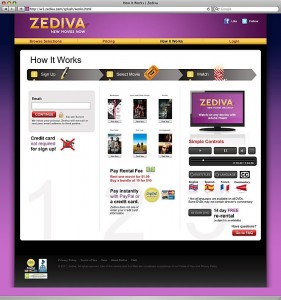Zediva – Latest VoD for $1 !

Via sfgate
A Sunnyvale startup has launched a new – and possibly controversial – way to watch top just-released DVDs like « The Social Network » and « The Fighter » over the Internet for as little as $1 each.
The company, Zediva Inc., buys DVDs when they are first released to the home movie market, pops them into a bank of rack-mounted, Web-connected DVD players in Santa Clara and streams the video on demand online.
And unlike other streaming services from Netflix Inc. and others, Zediva lets viewers access special DVD features like the director’s commentary and a variety of subtitles.
Although copyright experts say Hollywood studios may have grounds to haul the 3-year-old startup into court, Zediva executives say a federal court ruling gives the company a legal green light.
« We believe there is precedent for what we are doing and that we are fully compliant with the law, » Vivek Gupta, co-founder and chief technical officer, said in an interview before Zediva’s official launch last week.
Waiting list
Zediva was immediately overwhelmed with requests by people who wanted to register. A company spokesman said Zediva is putting new members on a waiting list while it adjusts to meet the heavy demand.
Online video streaming has seen explosive growth in the past year. And the research firm NPD Group said Netflix of Los Gatos now has a 61 percent share of movies downloaded or streamed, with Comcast second at 8 percent and DirecTV, Time Warner Cable and Apple tied for third at 4 percent.
« Sales of DVDs and Blu-ray discs still drive most home-video revenue, but (video-on-demand) and other digital options are now beginning to make inroads with consumers, » NPD entertainment industry analyst Russ Crupnick said in a press release. Zediva bridges physical discs with streaming video, but tries to separate from the pack by offering newly released DVDs that may not be immediately available for streaming on other services or aren’t bound by strict time restrictions.
« Our goal is to have the top 100 movies of the last 12 months at any time, » said Venky Srinivasan, co-founder and CEO.
It costs $1.99 per movie, or 10 rentals for $10, which includes unlimited playback for up to 14 days. Essentially, members get a long remote control for up to four hours at a time to a DVD player stocked with selected film. If all copies of that movie are being watched, they must wait until a DVD becomes available.
Standard definition
For now, Zediva streams in standard definition 480p, but its technology supports resolutions up to a high-definition 1080p. Playback works on Macintosh and Windows computers. Zediva also works on Google TV and devices using Android 2.1 or later, with iPad and iPhone support on the way.
The movie studios have been charging fees for the rights to movies that can be streamed. New home releases like « The Fighter » and « The Social Network » are not available for Netflix’s « Watch Instantly » feature. However, they are available for streaming on Blockbuster and Amazon.com, but the rental costs $3.99 and must be watched within 24 hours.
Srinivasan said the company is in « confidential talks » with studios, which aren’t receiving any extra revenues from the company apart from the money Zediva pays for the DVDs. But he said Zediva’s is covered under laws that have allowed video rental stores to rent physical copies of DVDs or libraries to lend books.
Zediva is also relying on an August 2008 federal court of appeals ruling that allowed cable TV operator Cablevision Systems Corp. to set up a networked DVR system. Instead of installing boxes in individual homes, Cablevision sought to allow subscribers to access shows they recorded from central DVRs.
The appellate judges held that Cablevision could play back shows remotely « to a single subscriber using a single unique copy produced by that subscriber. » The U.S. Supreme Court later declined to review the ruling.
Legality question
Zediva contends that ruling allows the same one-to-one remote playback from a networked DVD.
The Motion Picture Association of America, which represents the six major U.S. movie studios, declined to comment on Zediva. However, copyright experts contacted for this story questioned whether Zediva’s legal theory would hold up in court because its technology results in a « public performance » that requires permission from the owners of the work.
« In my view, what Zediva does is illegal, » said Douglas Lichtman, a UCLA law professor who specializes in patent and copyright law. « By sending the same DVD content to different people at different locations at different times, Zediva publicly performs that material without permission. You can buy 15 copies and show them to 15 people. You can buy 1,000 copies and show them to 1,000 people. But you cannot buy one copy and show it to 15 people. »






